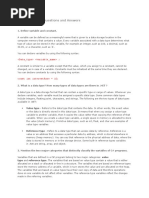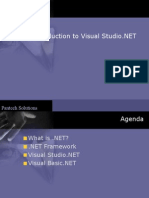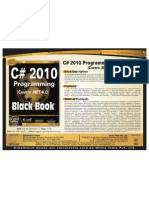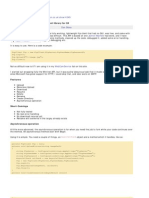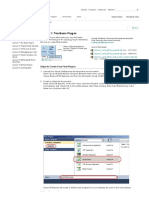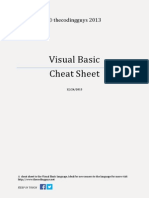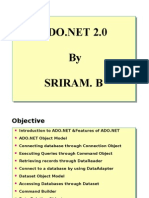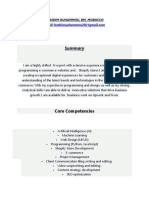Advanced Csharp Programming Course Outline
Uploaded by
testing engAdvanced Csharp Programming Course Outline
Uploaded by
testing eng(p t y) lt d .
PO Box 94 tel : +27 12 666 2020
1995/04149/07 Raslouw, 0109 fax: +27 12 666 2021
www.incusdata.com
Price: R9,500.00 excl. VAT
Duration: 5 days Advanced C# Programming
Code: ACSHP
Description
This course will take you to the next level as a C# programmer. You will learn more advanced features
of the C# programming language and the .NET framework, including threads, collections, web
services, XML and security.
Objectives
Aer you have completed the Advanced C# Programming course, you will be able to:
■ Understand advanced C# language features.
■ Apply advanced object-oriented principles in your C# code.
■ Apply file access and serialization concepts.
■ Develop multi-threaded applications in C#.
■ Use ADO.NET to develop database applications.
■ Understand .NET interoperability services and security.
Intended Audience
You should attend the Advanced C# Programming course if:
■ You are a C# programmer and you want to learn about the advanced aspects of the C# language.
■ You are a C# programmer and you want to learn to write better C# code.
Prerequisites
Before you attend the Advanced C# Programming course:
■ You must have attended our C# Programming course or already be comfortable with the
fundamentals of the C# programming language.
■ You should have at least 6 months practical experience programming in C#.
Course Contents
Overview
■ Review of the .NET platform and the C# language.
■ Portability issues.
Object-Oriented Programming
■ Class hierarchies.
■ Partial classes.
■ Cross-language inheritance.
■ Abstract classes.
■ Sealed classes.
■ Overriding System.Object Methods.
■ Reference types.
■ Casting & conversions.
■ Constructors.
■ Interfaces.
Collections, Structs and Enums
Courses 2019 Advanced C# Programming Incus Data (Pty) Ltd
(p t y) lt d . PO Box 94 tel : +27 12 666 2020
1995/04149/07 Raslouw, 0109 fax: +27 12 666 2021
www.incusdata.com
■ .NET Collections.
■ Ordered vs. unordered collections.
■ Object-based classes.
■ Generic collections.
■ Using Structs.
■ Using Enums.
Operator Overloading
■ Overloading mathematical, comparison, conversion operators.
■ Overloading ToString.
■ Overloading GetHashCode.
Reflection and Attributes
■ Intrinsic attributes.
■ Custom attributes.
■ Reflection concepts.
■ Extracting type information.
■ Using reflection at runtime.
File Access and Serialization
■ Manipulating files and directories.
■ Readers and writers.
■ Serialization I/O concepts.
■ Stream objects.
■ Object serialization.
Multithreading in .NET
■ Creating threads.
■ Thread management.
■ Thread synchronization.
■ Thread interoperability.
■ The Thread and ThreadPool classes.
Delegates and Events
■ Callbacks & delegates.
■ Single-cast vs. multi-cast delegates.
■ Delegate types.
■ Usynchronous vs. asynchronous delegates.
■ Custom events.
ADO.NET
■ The ADO.NET object model.
■ Connected vs. disconnected access.
■ Connection pooling.
■ Stored procedures.
■ Transactions.
■ Binding data to controls.
■ LINQ and SQL.
Courses 2019 Advanced C# Programming Incus Data (Pty) Ltd
(p t y) lt d . PO Box 94 tel : +27 12 666 2020
1995/04149/07 Raslouw, 0109 fax: +27 12 666 2021
www.incusdata.com
.NET Interoperability Services
■ Interactions between managed and unmanaged code.
■ Marshalling data.
■ PInvoke.
■ Callable wrappers.
■ Interop marshalling.
Miscellaneous
■ Security concepts.
■ Role-Based security.
■ Code Access security.
■ Security policy.
■ XML schemas.
■ XmlReaders and XmlWriters.
■ XmlDocuments
■ LINQ and XML.
** The lecturer reserves the right to modify the contents of the course to suit the needs of the delegates.
Courses 2019 Advanced C# Programming Incus Data (Pty) Ltd
You might also like
- FP-1000/1400 Fin Line: Global ExperienceNo ratings yetFP-1000/1400 Fin Line: Global Experience139 pages
- Basic .NET, ASP - Net, OOPS and SQL Server Interview Questions and AnswersNo ratings yetBasic .NET, ASP - Net, OOPS and SQL Server Interview Questions and Answers11 pages
- Instant ebooks textbook Full Stack Python Security Cryptography TLS And Attack Resistance 1st Edition Dennis Byrne download all chapters100% (7)Instant ebooks textbook Full Stack Python Security Cryptography TLS And Attack Resistance 1st Edition Dennis Byrne download all chapters50 pages
- Building N-Layered Applications With ASP - NET 4.5 PDF100% (2)Building N-Layered Applications With ASP - NET 4.5 PDF164 pages
- Low Level Virtual Machine C# Compiler Senior Project ProposalNo ratings yetLow Level Virtual Machine C# Compiler Senior Project Proposal30 pages
- Visual Basic 2015 - The Complete Beginners Guide 1No ratings yetVisual Basic 2015 - The Complete Beginners Guide 1194 pages
- Microsoft Press CSharp Programmer's CookbookNo ratings yetMicrosoft Press CSharp Programmer's Cookbook11 pages
- Programming C# Extended Features: Hands-On: Course 973No ratings yetProgramming C# Extended Features: Hands-On: Course 973376 pages
- Developing ASP - Net MVC 4 Web ApplicationsNo ratings yetDeveloping ASP - Net MVC 4 Web Applications585 pages
- Deliver C# Software Faster With Source Code AnalysisNo ratings yetDeliver C# Software Faster With Source Code Analysis59 pages
- Routing, Controllers, Acti Ons, Views, Areas : Softuni TeamNo ratings yetRouting, Controllers, Acti Ons, Views, Areas : Softuni Team53 pages
- C# - Creating A Service To Monitor A DirectoryNo ratings yetC# - Creating A Service To Monitor A Directory6 pages
- Autodesk - My First Plug-In Training - Lesson 1 - The Basic Plug-In PDFNo ratings yetAutodesk - My First Plug-In Training - Lesson 1 - The Basic Plug-In PDF9 pages
- C# Coding Conventions (C# Programming Guide)No ratings yetC# Coding Conventions (C# Programming Guide)9 pages
- Visual Basic Cheat Sheet: © Thecodingguys 2013No ratings yetVisual Basic Cheat Sheet: © Thecodingguys 201314 pages
- (Ebook PDF) Fundamentals of C# Programming For Information Systems 2nd Edition All Chapters Instant Download100% (3)(Ebook PDF) Fundamentals of C# Programming For Information Systems 2nd Edition All Chapters Instant Download51 pages
- C# for Intermediates: A Complete Course for Intermediate ProgrammersFrom EverandC# for Intermediates: A Complete Course for Intermediate ProgrammersNo ratings yet
- Hands-On Microservices with JavaScript: Build scalable web applications with JavaScript, Node.js, and DockerFrom EverandHands-On Microservices with JavaScript: Build scalable web applications with JavaScript, Node.js, and DockerNo ratings yet
- PHP Strings Function: PHP: Indicates The Earliest Version of PHP That Supports The Function. Function DescriptionNo ratings yetPHP Strings Function: PHP: Indicates The Earliest Version of PHP That Supports The Function. Function Description23 pages
- 2.1.2 - Assignment Block With BOL ObjectNo ratings yet2.1.2 - Assignment Block With BOL Object46 pages
- AMAN MISHRA - Final Report - Aman MishraNo ratings yetAMAN MISHRA - Final Report - Aman Mishra36 pages
- Communication Protocol Specfication Edition D 989-329No ratings yetCommunication Protocol Specfication Edition D 989-329484 pages
- Startup Huddle Douala Is Looking For SponsorsNo ratings yetStartup Huddle Douala Is Looking For Sponsors9 pages
- Experience Verification Form For PMP ApplicationNo ratings yetExperience Verification Form For PMP Application6 pages
- EnterpriseReporter 2.6.0 ConfigurationManagerUserGuide EN PDFNo ratings yetEnterpriseReporter 2.6.0 ConfigurationManagerUserGuide EN PDF147 pages
- Industrial Automation - GSM Based Industrial Automation - Project ReportNo ratings yetIndustrial Automation - GSM Based Industrial Automation - Project Report7 pages
- HCC/HCF4013B: Dual 'D' - Type Flip-FlopNo ratings yetHCC/HCF4013B: Dual 'D' - Type Flip-Flop11 pages
- Damping of Power System Oscillations by VSC-HVDC Multi-Terminal Transmission NetworksNo ratings yetDamping of Power System Oscillations by VSC-HVDC Multi-Terminal Transmission Networks49 pages




